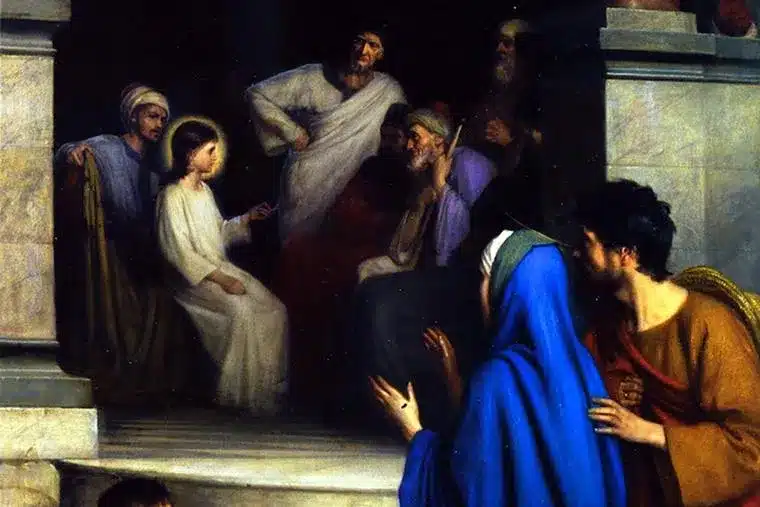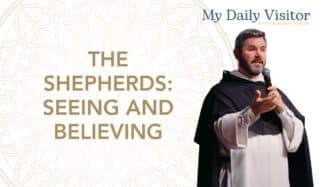“Wait for the Lord … take courage … wait for the Lord!” (Ps 27:14)
I have always found it fascinating that the Church begins every new liturgical year with a season of waiting, Advent. The last thing most of us want to do is wait. Because of the unprecedented amount of technology available to us now, we are perhaps the most impatient generation of people who have ever lived. Can anything good come from waiting?
Mother Church does not ask us to mark four weeks of waiting simply to develop patience in us (although that is not a bad lesson these days). She is reminding us of how long all creation had to wait for the arrival of the mother and her child whom God promised to send at the time of the Fall (cf. Gn 3:15). Their appearance on the horizon of human history would change everything, because together they would deal the death blow to God’s enemy, the devil. When the angel Gabriel appeared to Mary in Nazareth to announce God’s plan, Creation was assured that God keeps his promises. We can count on what he tells us he will do. Our waiting can be expectant, like the psalmist once described: “my soul waits for the Lord more than those who watch for the morning” (Ps 130:6). The watchmen of Israel did not wait to see if the sun arrived, but when. This is especially good news for us, because Advent is also a season of waiting for Christ’s second coming, when he will return in triumph and usher in the fullness of his kingdom. His first coming gives us confidence about his next one.
Did the waiting time between God’s promise in Eden to defeat his enemy and the arrival of Gabriel to announce the beginning of that victory need to be so long? To answer that, we should think about how much we would not know about God or ourselves without that long stretch of time in which the story of our salvation was revealed to us in the Old Testament. Would we know how faithful God is to the promises he makes? Would we understand how fickle and weak we are? Would we be humbled to find how many times, over and over, God forgave his willful children, proving the depth of his love for them? Would we know of the many human examples of both great faith and great wickedness who can help us live wisely? Without the compelling (and long) story of God’s pursuit of us written in the Old Testament, would we really believe we need a Savior?
Because waiting for anything we urgently want or need is difficult for our restless, self-absorbed human nature, sometimes waiting brings out the worst in us. Yet sometimes waiting can do the opposite. It can confirm to us that, ultimately, we are powerless over our lives, and that can lead to humility. We turn to God for the help that only he can give. We recall what we know about him, what we have experienced with him, and we come to accept his timing, not ours. Waiting can lead to peace.
Hannah’s gifted waiting
There is a woman in the Old Testament who is a wonderful example of the good gift that waiting can be in those of us who want to walk with God. Her name is Hannah, which means “grace” in Hebrew. She lived during a turbulent time in Israel’s history before there was a king to keep order in the nation, and her story is recorded for us in the First Book of Samuel. She was married to a man named Elkanah, and she was barren. Elkanah took a second wife, Peninah — probably because of Hannah’s barrenness — and she was quite fertile. This became a source of great pain for Hannah (1 Sam 1:6-8):
Her rival used to provoke her severely, to irritate her, because the Lord had closed her womb. So it went on year by year; as often as she went up to the house of the Lord, she used to provoke her. Therefore Hannah wept and would not eat. Her husband Elkanah said to her, “Hannah, why do you weep? Why do you not eat? Why is your heart sad? Am I not more to you than ten sons?”
Hannah suffered from her infertility for a long time. It was compounded by Peninah’s provocation and Elkanah’s inability to understand why his love was not enough to make Hannah happy. What was her response to both these people in her life who made her suffering worse, not better (1 Sam 1:9-11)?
After they had eaten and drunk at Shiloh, Hannah rose and presented herself before the Lord. Now Eli the priest was sitting on the seat beside the doorpost of the temple of the Lord. She was deeply distressed and prayed to the Lord, and wept bitterly. She made this vow: “O Lord of hosts, if only you will look on the misery of your servant, and remember me, and not forget your servant, but will give to your servant a male child, then I will set him before you as a nazirite until the day of his death. He shall drink neither wine nor intoxicants, and no razor shall touch his head.”
Hannah was a devout woman; she and her husband went every year to worship God in Shiloh. When her suffering reached its peak so that she could not even eat, instead of retiring to her bed, she went straight to the temple to pray. This suggests that prayer was a regular and important part of her life. She had likely prayed for a child over many years, because she had ready words to use when she went before the Lord. Calling herself his “maidservant,” she begged for a son and promised to return him to the Lord “all the days of his life.” What generosity in this woman who had suffered so much! The story reads further (1 Sam 1:12-18):
As she continued praying before the Lord, Eli observed her mouth. Hannah was praying silently; only her lips moved, but her voice was not heard; therefore Eli thought she was drunk. So Eli said to her, “How long will you make a drunken spectacle of yourself? Put away your wine.” But Hannah answered, “No, my lord, I am a woman deeply troubled; I have drunk neither wine nor strong drink, but I have been pouring out my soul before the Lord. Do not regard your servant as a worthless woman, for I have been speaking out of my great anxiety and vexation all this time.” Then Eli answered, “Go in peace; the God of Israel grant the petition you have made to him.” And she said, “Let your servant find favor in your sight.” Then the woman went to her quarters, ate and drank with her husband, and her countenance was sad no longer.
Hannah went to the temple to find solace before the Lord, but she was met with a firm rebuke from the priest who thought she was drunk. Yet, instead of angrily accusing him for his misjudgment of her, she humbly explained what she was doing. Perhaps this is the fruit that waiting on God, crying out to him, persevering in prayer when he does not answer our request can produce. Once we understand that only God can make the difference in our difficult situation, we, like Hannah, do not need to waste time lashing out at others when we are in pain. She patiently told him: “I have been pouring out my soul before the Lord.” She called herself Eli’s “maidservant,” showing Eli the same respect she showed to the Lord. Confronted with her pious simplicity, the priest immediately understood his mistake. He gave her a blessing, which Hannah took as a promise that the Lord would grant her prayer, “and her countenance was no longer sad.”
In due time, Hannah conceived and bore a son, naming him Samuel, whose name means “I have asked him of the Lord” (1 Sam 1:20). She nursed him for several years, and then she and Elkanah took him to Eli in Shiloh for their annual worship there (1 Sam 1:26-28):
And she said, “Oh, my lord! As you live, my lord, I am the woman who was standing here in your presence, praying to the Lord. For this child I prayed; and the Lord has granted me the petition that I made to him. Therefore I have lent him to the Lord; as long as he lives, he is given to the Lord.” She left him there for the Lord.
How was Hannah able to let go of the son for whom she prayed for so many years? How many tears, sleepless nights, sorrow-filled days did this boy, standing before the priest, represent? What can explain this? Because she had waited so long for a child, Hannah knew that only by God’s gift did she give birth to him. Samuel was God’s gift to her, the gift of all her waiting. With a heart full of gratitude, Hannah believed that the only fitting response she could make, the only way she could truly thank God for his goodness to her, was to offer the boy back to him to serve him all his days. Extraordinary, isn’t it? For her long perseverance, not only was Hannah given the gift of a child, she was also given the gift of the purification — the refining of her soul — that waiting can produce. How remarkable that after giving Samuel to Eli, she did not collapse into a heap of sobbing. No, she and her husband “worshiped the Lord there.”
This was not the end of Hannah’s life with Samuel. She was able to visit him once a year when her family went to Shiloh to worship (1 Sam 2:19-21):
His mother used to make for him a little robe and take it to him each year, when she went up with her husband to offer the yearly sacrifice. Then Eli would bless Elkanah and his wife, and say, “May the Lord repay you with children by this woman for the gift that she made to the Lord”; and then they would return to their home. And the Lord took note of Hannah; she conceived and bore three sons and two daughters. And the boy Samuel grew up in the presence of the Lord.
This beautiful scene helps us understand why Hannah spoke of lending Samuel to the Lord instead of giving him outright, which is what she actually did. Hannah would always be Samuel’s mother; her heart still beat for him as it did from the moment she knew she was with child. Although he lived and served in Shiloh for the rest of his life, Samuel was never far from his mother’s love. This scene also reminds us that sacrifices we make for the Lord always make us fruitful people. For Hannah, God filled the void left by Samuel’s absence with many other children. She was literally fruitful, after her long travail of infertility. She had been generous with God, and he was generous to her.
Mary’s gifted waiting
Reading Hannah’s story reminds us of mother Mary, who also received a cherished son as a gift from the Lord, yet willingly gave him back to him. Perhaps Mary was thinking about Hannah’s generosity when she and Joseph found Jesus in the Jerusalem Temple. She recognized from his words to her that his life would be spent doing the Father’s work. She knew a change was coming, and she accepted it with generosity. Mary had to wait a long time to see Gabriel’s promises (cf. Lk 1:32-33) and Simeon’s prophecies (cf. Lk 2:29-32) about her Son begin to be fulfilled. She spent 30 years at home with Jesus before his public ministry began. Those “hidden years” are another example of fruitful waiting. As Pope St. John Paul II has written in “Theotokos: Woman, Mother, Disciple,” Mary was Jesus’ motherly teacher up until his finding in the Temple. After that, he would, over the years, reveal to her his full awareness of being the Son of God and the mission he had from his Father. Mary “thus became the humble disciple of the Divine Master to whom she had given birth.” Those were long years of fruitful waiting, as Jesus formed Mary for her own part in that mission.
Just as God made Hannah’s sacrifice fruitful, filling her life with children, he also made Mary’s sacrifice fruitful, giving her another son, John, at the foot of the cross, as well as all those who keep the commandments of God and bear testimony to Jesus (cf. Rev 12:17). Both Hannah and Mary sang songs of praise for God’s mercy to his people (cf. 1 Sam 2:1-10; Lk 1:46-55). They both knew that God keeps all his promises, no matter how long we must wait. Their prayer songs also bear testimony that the long wait between God’s promise to defeat his enemy early in the Old Testament and its fulfillment in the New Testament revealed the richness of God’s love for his people, in all times and places, in all circumstances. In that sense, the long wait Scripture details in the record of salvation history is a gift to all of us, too.







